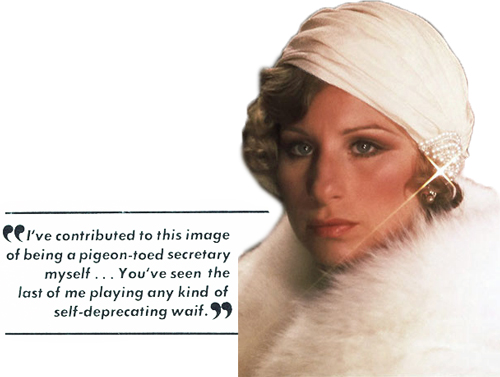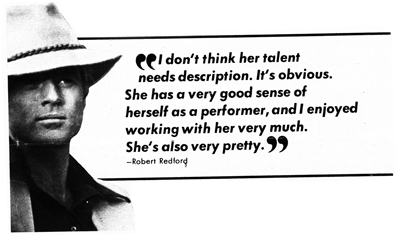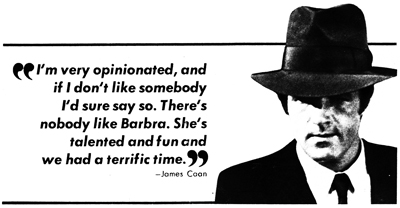Barbra, Is It You?
Seventeen Magazine — September 1975
Unhappy about the way she thinks people see her, Barbra Streisand is bent on changing her image
by Edwin Miller

Among moviedom’s superstars Barbra Streisand is unique. Her kooky humor. Her genius for making you feel she's an old friend from the moment she pops on screen. The relish for living that emanates from her performance. Her vulnerability. The electric way she has of belting out a romantic ballad. She is the only female star today whose movies seem certain to make a profit (although she has had her share of disasters, such as HelIo, Dolly! and On a Clear Day You Can See Forever).
In a very real sense she is the core of a multimillion dollar business whose total product—movies, records, television and personal appearances— revolves around what she does with her face, her voice, her personality. She is a very important person to a great number of people whose livelihood depends upon her creativity and her happiness. Their main interest lies in protecting her and, in so doing, protecting themselves.
Generally Barbra refuses interviews, maintaining she's misunderstood, that no one wants to tell about her the way she really is. "Sometimes l get very hurt by what I read about myself,” she tells me during a meeting about her movie, Funny Lady. “Most people write about me based on the past. The image l had as Miss Marmelstein"—referring to the part she played of a gawky secretary in a 1962 Broadway musical, I Can Get It for You Wholesale, which made her a star. “Except for some fashion magazines, they don't say anything good about the way I look. They all make fun of me. Maybe it's just a journalistic ploy," she adds darkly. "Or maybe they really think I'm not attractive. But l don't think,” she says meaningfully, “that l could be a movie star if l weren't. Nobody talks about that!"

Not long before, l had seen Barbra talking with Barbara Walters on NBC’s Today show. She explained to Barbara that she is not temperamental, that she thinks distortions about her are printed because male writers can't cope with a woman who has opinions. She is, she insisted, a threat to their egos! "lt’s always a journalistic Cinderella story," she says. “The image of this homely girl who makes good. It's boring!"
Barbra neglects to mention that requests for interviews are usually countered by her request—through representatives—for a “letter of guarantee" that she will have complete text approval (not, however, in this instance) and a proviso that the article will only be printed once. If you don't like it, lump it. Presidents, ballerinas, international financiers would be denounced if they had the nerve to make such a request. But Barbra has been elected to the office of superstar by public acclaim. And is likely to remain there for the rest of her professional career.
"The truth is," says Barbra, picking up her train of thought, "l've contributed to this image of being a pigeon-toed secretary myself. By playing a kind of role which |'m not going to do anymore. You've seen the last of me," she informs me, "playing any kind of self-deprecating waif. Funny Girl. Funny Lady. Even in The Way We Were, playing a girl who is a political activist because she feels she doesn't look like someone who could be Robert Redford’s girl friend!
“People think I'm really like my movies, that my roles are somehow an extension of myself. Totally false!" she declares. “But when I tried to be different," she continues plaintively, “as in Up the Sandbox, in which I played a real person who didn't have any star flash, people didn't really respond. That's binding for an artist. I don't want to do just what I'm expected to do, because it's no fun. Every time I've changed myself musically or esthetically, it's been hard for people to adjust.

“Even the comments I've had about my hair." Barbra’s hair is long and blond now, no longer the chestnut brown I remember. “They say, ‘Wait a minute! Why is it wavy? We want it straight.’ Actually my hair isn't one or the other. Yesterday it was straight. Last night I put up my little braid and today I have waves. I like to amuse myself," she explains. “I like to look in the mirror and see something a little different, not the same thing all the time. I like to dress up" —Barbra has been elected twice to a list of the internationally best dressed — “and I enjoy going around like a slob, wearing dungarees."
Every performer feels a need for protection from endless requests to share themselves: time for interviews, for signing autographs, for fans who seize their hands in restaurants. The bigger the star, the more he or she feels that doing his thing, whether it be acting, singing or ad-libbing, should be enough to satisfy the hunger of an audience. Show-business people know no more than supermarket managers, shoe salesmen or insurance brokers about the meaning of life, how to handle interpersonal relationships or astrology. Yet the more audiences are moved by an individuaI's talent, the more they want to know of his or her personal life, hoping for someone they admire to give meaning to their own experience.
Teen-agers today, however, are no longer as naive as they once were, searching for glamour, yearning to identify with those pretty faces they saw on the screen. In the world of entertainment, rock has been the great leveler. Vast auditoriums are packed with young people in jeans and T-shirts at one with performers who look just like themselves. Today's girl is a real girl. She may be pretty. Or she may have a prominent nose, uneven teeth. She doesn't worry about being a beauty in the old-fashioned sense. Emotional honesty is more important. She is searching for the person she is, not for a plastic image with which she can conquer a boy, behind which she can hide her true personality. She wants to be accepted for what she is. To many such girls, Barbra is truth. Her face is unconventional. She is ambivalent. She has anxieties. She has purpose. She has determination. She has more credibility than most. In a marvelous way, she reflects the contemporary scene.
When her star was on the rise twelve years ago, Barbra declared to me, “I've always been a mixture of self-confidence and insecurity."
In those days, Barbra decked herself out in thrift-shop clothes, always with an old-fashioned garter on her knee. "When I was a kid in Brooklyn, I wanted to be a movie star. My mother hated it when I went to the movies because I was always grouchy for a couple of days. After looking at all those beautiful clothes and apartments, to come back to the place where we lived depressed me. We were poor—not poor poor—but l never had any dolls or toys or any of those things; we never even had a phonograph. That's why it's all such a kick to me now!"
Barbra always considered herself a great actress. Even at twenty she said, “Some people look at me and say, ‘Success has gone to her head,’ but that's not true. I've always been this way. I'm no good at dealing with people or being tactful. I say whatever is on my mind. I go by instinct. I don't worry about experience: I want to do things my way. I was like that when I was tweIve."
Seven years ago, Barbra made her movie debut as comedienne-singer Fanny Brice in Funny Girl, after creating the role in a Broadway musical. At the time, she modeled the character after herself. “I knew if I were true to myself,” she says now, “I'd be true to her essence because we were very much alike in some strange spiritual sense, even down to the fact that we both adored the color white.” With its sequel, Funny Lady, Barbra has grown more secure. Now she can play Fanny objectively instead of communing with her spirit on some mystic wavelength. “She was a tough character,” Barbra observes, “and I tried to underplay so it would be truthful and real. She was a woman who was really successful and didn‘t have to yearn anymore.”
James Caan, who costars with her in Funny Lady, says, “The most important thing to me is that I have a good time when I work—that I can laugh. If I’m not going to get along with someone, it’s really not worth being miserable three or four months of my life. You hear all kinds of funny stories about Barbra and it’s all a lot of garbage. I don’t know why so many people have thorns in them about Barbra. From the first day on, I was yelling at her, putting her down and calling her a spoiled rotten thing, and she would call me this or that and we’d carry on and we’d laugh. We laughed so much, three or four days we couldn’t even shoot. It’s not hard to get bad words out of me because I’m very opinionated, and if I don’t like somebody I’d sure say so. There’s nobody like Barbra. She’s talented and fun and we had a terrific time.”
Robert Redford’s experience was the same. “I don’t think her talent needs description,” he says. “It’s obvious. She has a very good sense of herself as a performer, and I enjoyed working with her very much. We had a good time.” He adds, “She’s also very pretty.”
Barbra’s next film will be a remake of A Star Is Born, the 1937 romantic drama which starred the late Fredric March as an aging movie star whose, actress wife, played by Janet Gaynor, was on the rise. It was remade in 1954 as a musical, with James Mason and Judy Garland. In Barbra’s version, she will be playing a rock star. “I’m into another period in my own development,” she explains. “The movie will be a sort of female liberation version of the original.” She adds, “I believe in mysticism. I don’t mean astrology, but this is the age of Aquarius, the age of women. Up to the time of Cleopatra, if you read the myths about the various goddesses, civilizations were ruled by women. Now I think the power of women is coming back. We’ll do a production number based on the myth of Isis and Osiris to dramatize the symbolism of A Star Is Born, showing the female rising above the male.”
She hopes Elvis Presley will be interested in costarring as her fading husband who helps her “believe in herself as a performer, enabling her to become successful on the stage, in movies and television.” (No comment was forth- coming from Elvis, who at the time was mulling over the purchase of Ringling Bros. and Barnum & Bailey Circus.) To prepare for the role, Barbra is learning the technical side of music for the first time. “I feel incapacitated when I get to a session and can’t say what I want is in F sharp minor with a flatted sixth.” And she is studying both piano and guitar. “It’s something I’ve never done all these years,” she says, looking down at her slender fingers.
“My character will start out as a songwriter the way today’s girls really are, writing and singing their own songs. I’ve never been able to write a song,” she muses. “Basically, I’m an interpreter. My role as an actress is to add very personal moments of truth and illuminate a character. I can look at a song or a script and detect the falsities, add a certain philosophical twist, but that’s as far as I can go. Sometimes I feel very inadequate.”
Bruce Lundvall, a Columbia Records executive who has been working with her throughout her recording career, observes: “You could put Barbra in front of a rock band or a symphony orchestra, she would still be Barbra Streisand, not compromising, not uncomfortable; the audience would not think she was out of her territory. And that’s the basis of a great talent, a great singing voice and interpretative skill.”
To direct A Star Is Born, Barbra is relying on the talent she perceives in Jon Peters, a Beverly Hills hairstylist with whom she has had a well-publicized romance. She scoffs at critics who point to Jon’s untested ability. “To be a good director,” she says, “you have to have an eye, sensitivity, know how to bring out the qualities in people you use.” She feels technicians can tell him such things as which lens to use on the camera. Barbra has described Jon as the “strongest” person she has ever met in his sense of self, perception, vitality. In the past, she observes, she didn’t like herself as much as she does now and was drawn to people unlike herself. Now, she finds she appreciates a kindred spirit.
Barbra’s story has been told many times. How her father, an educator, died of a cerebral hemorrhage in his mid-thirties when she was fifteen months old. How her mother, working as a book-keeper, raised her and her older brother, remarrying when Barbra was seven. Barbra wanted to be an actress from the beginning. At sixteen, after graduating from Brooklyn’s Erasmus Hall High School, she promptly moved to a Manhattan railroad flat which she decorated with second-hand furniture. Then gradually she found herself breaking into the nightclub circuit as a singer. She first met actor Elliott Gould in Wholesale. They married, had a son, Jason, in December 1966, and later were divorced. She’s since been on her own. Once, during her appearance at the most sophisticated nightclub of the time, a heckler asked her,“Are you from Brooklyn?” Barbra, with a smile that Mona Lisa would have been proud of, looked down at him and quipped, “Aren’t we all from Brooklyn at some time or other?”
Funny Lady’s producer, Ray Stark (Fanny Brice was his mother-in-law), says of Barbra that between the time she starred in Funny Girl and its sequel, “She’s changed like good wine. She’s gone through those formative years, and she’s come out of it magnificently. She’s concerned, she’s considerate. We fight like hell, but they’re all fights about creative opinions on which I can be right or wrong and she can be right or wrong. She’s just matured and become a lovely lady instead of a fiery, funny, kooky little girl.” Listening to Barbra, I don’t see that she has changed terribly much in the decade which has seen her rise to superstardom; all the things that made her what she was are still there, only more so. Like the dream she expressed to me in that forgotten restaurant: “I want to be famous. I don’t care whether it's by singing or acting or what, I want everybody to know my name. Even the cowboys!” They do.
End.
Note: “A Star Is Born” started filming in 1976 with Frank Pierson directing and Kris Kristofferson co-starring.
[ top of page ]
